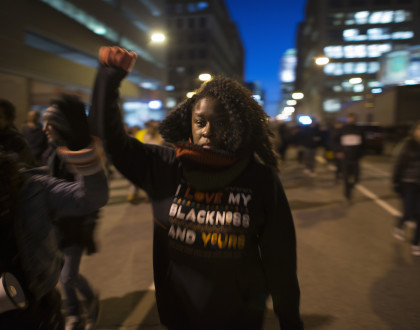#BlackGirlsMatter – Countering Criminalization in Schools

When I heard about a South Carolina sheriff’s deputy flipping a Black girl from her desk and dragging her across the floor (video here, cw: excessive violence), I was devastatingly reminded of how Black girls across the country are being degraded by the very institutions that are supposed to be dedicated to helping them flourish. Some might say, “Well, that’s just an isolated case,” and others might even attribute it to prejudice “typical of the south,” but the data proves otherwise. In fact, 90 percent of all girls suspended in New York in the 2011-2012 school years were Black, while not a single girl suspended was White. And how about the fact that Black girls represent 16 percent of female students, but nearly half of all girls with a school-related arrest?1 There’s a trend here and YWCA USA, the African American Policy Forum (AAPF), and our team here at YW Boston are talking about it.
Earlier this month, YWCA USA co-sponsored the AAPF’s #HerDreamDeferred. This year was AAPF’s second annual Week on the Status of Black Women and addressing the fact that Black girls are being criminalized in schools from a very young age was a priority topic. As a Black woman who was once sitting in those desks, it really got me thinking about my own role as an educator and my responsibility in creating safer spaces for Black girls. Here, I share some of my reflections inspired by the discussion in an effort to amplify the current critical dialogues about the safety of Black girls.
The #HerDreamDeferred panelists – Monique W. Morris, Priscilla Ocen, Samantha Master, Nadiyah Shereff and moderator, Kimberlé Crenshaw – tackled some really challenging questions: Are Black girls really fine? Are we taking them seriously when they come to us with their stories about being victimized in schools? Are we acknowledging historical traumas and the legacy of racism that has made the increased police presence in school so dangerous? And importantly, how do we talk to our girls about this while we send them off to school? I felt compelled to think deeply about the criminalization of Black girls in schools, our collective roles in our various institutions in perpetuating this violence, and our potential to be leaders in creating safer spaces for our girls.
I’ve been thinking about key classroom trend that has produced numbers like the ones presented above: the “attitude” of Black girls often becomes life defining when we send them off to school.
When Black girls ask critical questions (e.g., “Why do we have to do this?”), they are deemed disruptive, and often, when their peers (especially White peers) ask questions, they are labeled as inquisitive, engaged learners.
We have educators misinterpreting Black femininity and discouraging their critical thinking.
As a panel of Black women, speakers were pulling from their own experiences in schools, but also citing statistics like this one: Black girls are suspended at six times the rate of White girls. The problem is so much more than racist diagnoses of “attitude problems,” as there’s a deeper historical legacy, but “we have to talk about both because both are pushing our girls out of schools.” Take dress code policies and hairstyle violations; for example, we can talk about When Black Hair is Against the Rules and how 7-year-old Tiana Parker was told her dreadlocks violated her elementary school’s dress code in Tulsa, Okla., or how 12-year-old Vanessa VanDyke was threatened with expulsion from her private school in Orlando, Florida because her natural hair was deemed a distraction. Schools are just one of many U.S. institutions that have always taken issue with Black hair and, therefore, Black girls and women.
The criminalization of Black girls is multidimensional, cross-institutional, and backed by a lot of power, so when we think about disciplining Black girls, we should be asking questions: “What contributes to behaviors that we deem problematic? Are we addressing those root causes?” It seems that, at the core, we’ll often find, “a collective failure to recognize the humanity of Black girls and hold ourselves accountable to protecting them as much as their peers.” What do we do with all of this? Well, one thing we can continue to do is ask these questions. One panelist expressed, “We cannot implement safety ourselves…” as parents, guardians, and mentors, “…so, how are we creating space for [Black girls] to tell their stories and demand leadership from us?”
There is no clear, single answer, but I believe there is hope. One of the most encouraging aspects of the conversations I’ve been having addresses talking to our girls as we send them off to school. Much of what we, especially Black mothers, guardians, mentors and educators, can do is rooted in love. We must, “tell them they are sacred to and loved by our community,” and “instill a sense of deservedness and tell them they are autonomous and whole.” Most importantly, we must listen to their stories. We can no longer be silent about the fact that Black girls are being criminalized from a very young age. “There are no throwaway children.”
You can check out some additional data and recommendations here.
Image credit: Fibonacci Blue under the Creative Commons License
Other resources:
